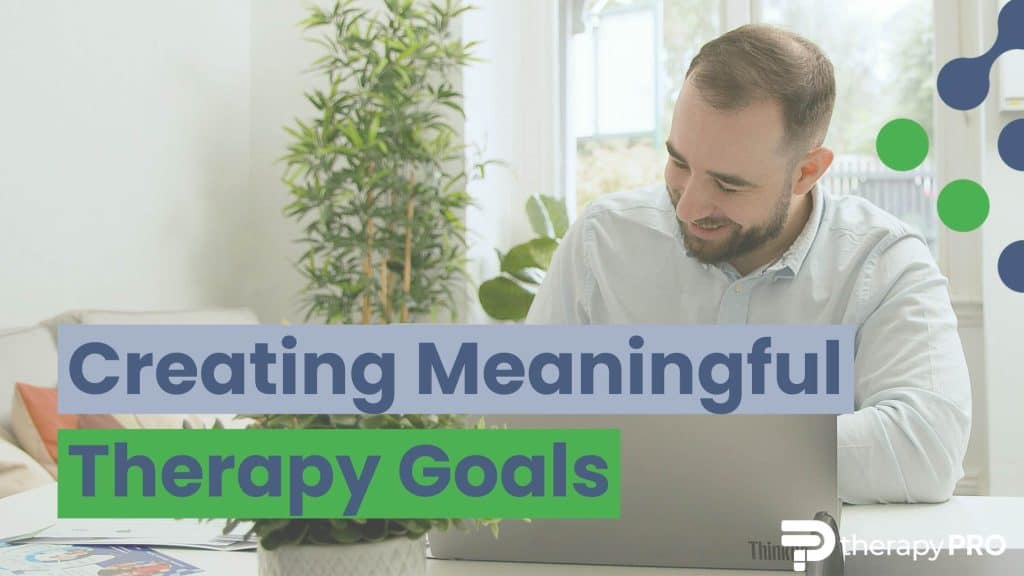Creating Meaningful Therapy Goals: An Integrated Approach
Setting therapy goals can be both empowering and daunting. Realistic and achievable goals provide a roadmap for progress and ensure that therapy is effective and meaningful.
Whether you’re working on improving speech, developing daily living skills, managing mental health, or fostering positive behaviour support, having a unified approach to goal-setting ensures that all members of your therapy team are aligned, making the process smoother and more coherent.
The Importance of a Unified Goal-Setting Approach
At Therapy Pro, we understand that therapy can sometimes feel overwhelming, especially when different disciplines might use varying methods to set goals.
This can lead to confusion for clients and their families, making it difficult to track progress and stay motivated. That’s why we emphasise a streamlined and integrated approach to goal setting.
This approach means that no matter which therapy discipline you’re engaged with – whether it’s speech therapy, occupational therapy, psychological support, social work, or positive behaviour support – our team uses a cohesive method that keeps everyone on the same page.
By aligning our methods, we ensure that your therapy journey is consistent, well-coordinated, and free from unnecessary complexities.
A unified approach also fosters better communication among your therapy team, leading to more co-ordinated care. When all team members understand and work towards the same goals, it reduces the chances of conflicting advice or strategies.
This harmony in goal setting not only boosts the effectiveness of the therapy but also ensures that you and your family feel supported throughout the process.
A Family-Centric Methodology
Therapy at Therapy Pro isn’t just about the individual – it’s about the whole family.
We believe that the most successful therapy outcomes occur when clients and their families are actively involved in the goal-setting process. This means that goals are created with you, not just for you, ensuring that they reflect what is truly important in your life.
For example, rather than focusing solely on improving specific skills, our approach encourages setting goals that involve activities the entire family can enjoy together, such as going on a family bike ride or participating in a shared hobby. These goals provide the family with choice and control, fostering greater engagement and ownership of the therapy process. This collaborative method ensures that families are not just bystanders but are central to the therapy journey.
Involving families also means that therapy goals are more likely to be meaningful and relevant. When a goal resonates with the whole family, it becomes easier to stay motivated and committed. Additionally, having the family involved in regular goal reviews helps ensure that goals remain aligned with the family’s evolving needs and aspirations.
Our Preferred Method for Setting Therapy Goals
To maintain consistency across all therapy disciplines, Therapy Pro therapists often use the Goal Attainment Scale (GAS) as their preferred method for setting and tracking therapy goals.
GAS is a flexible tool that helps set clear targets and measure progress in a way that’s easy to understand, making goals more fun and achievable.
This method harmonises well with other assessment tools and provides a consistent framework that can be applied across different therapy types.
Imagine you’re setting goals for something you want to achieve, like improving your skills, your hobby, or working towards trying something new. GAS is a way to set these goals and track how well you’re doing over time. It’s like having a special scoring system to see how close you are to reaching your goals.
How GAS Works
Set Your Main Goal: Think about what you really want to achieve. This is your main goal. For example, if you’re learning to play basketball, your goal might be to make more baskets during a game.
Create a Scale: Now, imagine you have a scale from -2 to +2. This scale helps you measure your progress. Here’s what each number might mean:
- +2: You did much better than your goal. (You made 10 baskets instead of the 5 you were aiming for!)
- +1: You did a bit better than your goal. (You made 6 baskets, so a little more than expected.)
- 0: You reached your goal exactly. (You made 5 baskets, which was your target.)
- -1: You did a bit worse than your goal. (You made 4 baskets, so not quite what you hoped for.)
- -2: You did much worse than your goal. (You only made 2 baskets, so far less than expected.)
Monitor Your Progress: As you practice or work towards your goal, you check how you’re doing and score yourself on the scale. This way, you know if you need to try something different, keep doing what’s working, or maybe even set a new goal.
Here’s another example where you might be working on managing anxiety, rather than learning a new skill:
Set Your Main Goal: To manage anxiety, your goal might be to reduce anxiety symptoms. Let’s say your specific goal is to practice deep breathing exercises daily to reduce anxiety levels by 50% over three months.
Create a Scale: Next, create a scale to measure your progress. Imagine you have a scale from -2 to +2 that helps you see how well you’re doing:
- +2: You exceeded your goal significantly. (For example, you experienced an 80% reduction in anxiety levels, well beyond your target.)
- +1: You did a bit better than your goal. (You achieved a 60% reduction in anxiety levels.)
- 0: You hit your goal right on target. (You reduced anxiety levels by 50%, as planned.)
- -1: You did a bit worse than your goal. (You only managed a 40% reduction in anxiety levels.)
- -2: You did much worse than your goal. (You only saw a 20% reduction in anxiety levels, far less than expected.)
Monitor Your Progress: As you practice your deep breathing exercises each day, check in on your progress regularly. Use the scale to see how you’re doing—whether you’re on track, need to adjust your approach, or might even want to set a new goal based on what you’ve learned. This way, you can stay motivated and make sure your therapy is working for you.
By using GAS, we ensure that your goals are not only achievable but also adaptable, making them more meaningful and motivating. This approach also allows for a more nuanced understanding of progress, as it takes into account the complexities of therapy and the individual nature of each client’s journey.
How Therapy Pro Implements the Integrated Approach
At Therapy Pro, our integrated approach to goal setting isn’t just a concept—it’s a practice embedded in our daily operations.
Our therapists regularly collaborate to ensure that all goals, regardless of the discipline, align with the overall therapy plan. We use tools and technology to track and report on goals, ensuring transparency and consistency in how progress is measured.
Additionally, our team holds regular multi-disciplinary team meetings to review client goals and progress. These meetings are an opportunity for therapists from different disciplines to discuss their observations and insights, ensuring that every aspect of your therapy is considered and aligned with your goals.
We also recognise that goals may need to be adjusted over time.
Life changes, and so do your needs. That’s why we place a strong emphasis on flexibility.
If a goal is no longer relevant or needs to be modified, we work with you to make those changes, ensuring that your therapy remains effective and meaningful.
Overcoming Challenges in Goal Setting
While setting therapy goals is crucial, it’s not without its challenges.
Balancing different needs, keeping goals realistic yet challenging, and ensuring that goals remain relevant over time can be difficult. However, our unified approach helps mitigate these challenges.
By involving you and your family in the process, we make sure that goals are not only achievable but also significant to your life. Regular reviews and open communication ensure that any obstacles are addressed promptly, keeping your therapy on track.
Working to Achieve Your Goals Together
At Therapy Pro, setting goals isn’t just about the outcome, it’s about the process.
By taking a collaborative and unified approach to goal setting, we make sure that every step of your therapy journey is clear, consistent, and aligned with your needs and those of your family.
If you or your loved one requires support, our team is here to help. Contact us today to start setting meaningful and achievable therapy goals that make a real difference.




